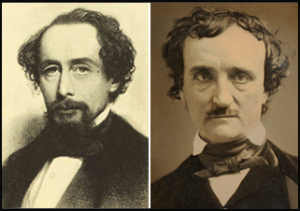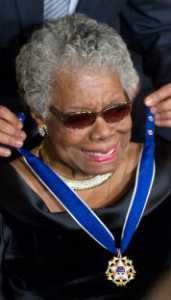 By John Breneman
By John BrenemanA handy compendium of humorous tips inspired by some of the great writers of our time.
1. Get ready. Some writers like to do warmup exercises before getting down to business. Ernest Hemingway was fond of wrestling a grizzly bear before starting a new novel. Walt Whitman enjoyed an invigorating stroll through forest and meadow. And the great Shakespeare was said to favor an intense two-hour regimen of aerobics, calisthenics, and pounding the heavy bag.
Every writer has his or her own routine of last-minute preparations. Some lean way back and crack their knuckles. Others vigorously rub their temples – waking up the old brain, but stopping before any permanent neurological damage is done.
Still others fortify themselves with coffee, booze or Phillips’ Milk of Magnesia. Edgar Allen Poe liked to gaze out the window to see if he could make eye contact with a raven or crow.

Legend has it Charles Dickens earned barely a nickel for “Nicholas Nickleby,” while Edgar Allen Poe received rave reviews for “The Raven.”
Enough preparation, it’s time to sit down and write. But first …
2. Pay attention to posture. All the great writers slouch like hell. Charles Dickens sat with his spine contorted at a particularly grotesque angle when he conceived and wrote “Oliver Twist.”
To be a great writer, your posture must be extremely poor. Slouch way down in an uncomfortable chair. Sit on one of your legs to help inhibit the flow of blood to the head and other vital organs.
Herman Melville is said to have experienced an important revelation in his classic novel “Moby Dick” while gripped by a severe case of “pins and needles.” And Franz Kafka once brought his circulatory system so close to total cessation that he imagined himself turning into a giant cockroach. Voila! “The Metamorphosis.”
So practice hunching, slouching and fidgeting until you think you might actually be ready to write something. Then …
3. Go. Start writing, man! Don’t think too much. Just start cranking. Tap those keys. Move that pen. Go, go, go!!
Didn’t work, did it? I didn’t think so. That’s because you have to have something to say. Maybe I should have warned you about this little stickler back at the beginning. If you have an idea, excellent. If not, here are a few suggested writing topics:
- The internal conflicts that tear at your consciousness like so many flesh-eating boll weevils.
- That experience you had that was so astonishing that everybody would want to read about it.
- Monkeys.
Warning: Even if you have a workable idea, actually getting it to come out is not always easy. Jean-Paul Sartre is said to have stared at a blank piece of paper for 37 days before he wrote the existentialist masterpiece “Being and Nothingness.”
But, then again, there were no monkeys in that manuscript. In contrast, Edgar Rice Burroughs cranked out his first “Tarzan of the Apes” novel in an 81-hour writing marathon during which he ate only wild figs and bananas. And Margret Rey penned one of her “Curious George” books in several hours while under the influence of Red Zinger tea.
 Which brings me to my next tip …
Which brings me to my next tip …
4. Write what you know. Perhaps you’ve heard this old cliche. Well it’s true. Write what you know. BE the material.
Take John Steinbeck, for example. He ate a whole bunch of grapes and then got himself real angry before he sat down to write “The Grapes of Wrath.”
Dr. Seuss earned his Ph.D. in marine biology – did his homework you might say – before creating his timeless classic “One Fish Two Fish Red Fish Blue Fish.”
Jack Kerouac actually got into an automobile and set off on a series of “mad” adventures before he sat down to write “On the Road.”
Rumor is, Stephen King researched the impact of vampires on property values in dozens of Massachusetts towns before banging out “Salem’s Lot.”
The great Maya Angelou is said to have incarcerated dozens of pigeons, woodpeckers and parakeets before penning her first autobiography, “I Know Why the Caged Bird Sings.”
And Roald Dahl’s face was so smeared with sweet brown confections that his own mother barely recognized him by the time he finished writing “Charlie and the Chocolate Factory.”
You get the idea.
5. Use “action” words. That’s right, potent, provocative words like “ramjam,” “explosion” and “synergy.”
On second thought, don’t ever use the word “synergy.” It’s stupid and affected. Do you think Mark Twain ever mentioned synergy in “The Adventures of Huckleberry Finn”? Of course not. Did Holden Caulfield say it in “The Catcher in the Rye”? No. Too phony.
Synergy is a word best used only when making fun of corporate bigshots. Instead, try real action words like “sex,” “orgasm” and “action.” Eye-catching words like “bang,” “sonofabitch” and “triple-action.”
Here are a few more “action” words guaranteed to pep up your writing: projectile, killer bees and tsunami; atomic, bubonic and armageddon.
 6. Keep your day job. It is a source of ideas AND money you will definitely need to survive. Many noted writers had cool jobs that provided inspiration. Jules Verne got all the free helium he could huff while working for a balloon distributor, for example, and Rudyard Kipling was a part-time thoracic surgeon.
6. Keep your day job. It is a source of ideas AND money you will definitely need to survive. Many noted writers had cool jobs that provided inspiration. Jules Verne got all the free helium he could huff while working for a balloon distributor, for example, and Rudyard Kipling was a part-time thoracic surgeon.
7. Know when to end your story or column. Well, I guess that’s it for now. I’ve got plenty more tips, printed all nice in my new book “How To Write Good.”
John Breneman is the author of “Downsized! How I Got Laid Off After 30 Years in Newspapers and Turned My Funniest Sunday Advice Columns Into a Blockbuster E-book.”